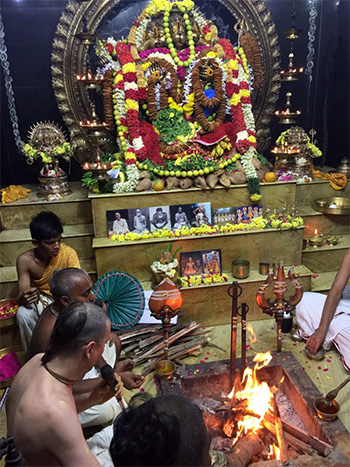Question: Why is it that only cows are granted a special status in Hinduism? It is difficult to believe that God has preferences. As far as I understand, everything and everyone is equal in the eyes of God.
Thank you for writing with your question. The Vedic texts give us the following injunction:
mahimsat sarva bhutani
“Never harm any living entity.”
In the Vedic culture, all living entities are treated with a special care, and it is our human duty to protect them. Thus one should not cause harm to any living entity. Though all living entities are respected and protected, the cow is given a very special status, so much so that harming a cow is considered a maha-pataka, or one of the greatest sins.
One of the reasons why the cow is given this special significance is due to its relationship with us. For example, all humans are equal, but we care more for our mother than for an unknown person. The relationship we have with our mother makes them more dear to us. The cow is especially dear to the followers of the Vedic culture because of the service the cow performs for us. From the cow we receive milk, which is the most essential food ingredient according to the Vedas. Milk is actually a transformation of the blood of the cow. By drinking the milk of the cow we are accepting her as our mother, and thus it is our duty to provide special care for her. Unfortunately today very little care is given to cows, what to speak of other living entities.
Among the animals, the cow is situated within the sattva-guna. There are three paths from which living entities can be elevated to the human form. These are through the body of the cow, the lion and the monkey. The lion and monkey belong to the rajo-guna and tamo-guna respectively. When the soul leaves the body of these three animals, it will attain a human birth. Out of 8,000,000 species, these are the three by which human birth can be attained.
The entire Vedic culture is based on sacrifice to God through yajna. For this the cow plays a crucial role as the provider of ingredients for sacrifice. Ghee is the prime ingredient used in all sacrifices, and for other types of worship the panca-gavya (five items from the cow) are used. Thus man is dependent on the cow for numerous things.
The cow is an emblem of service. And this service is what grants the cow a special status. The monkey and lion perform little service for others, as is the case with most other living entities. Even among the humans there are those who perform more selfless service and those who do not. For example, in the ancient times the brahmanas (those qualified with truthfullness, austerity, etc.) were required to teach the spiritual knowledge to others free of charge. They received no salary for their services, though sometimes they received remuneration in the form of donations and alms. Because they engaged in selfless service, they were glorified in society and given a special position.
Beyond this qualification of selfless service there is an even higher qualification which actually catches the eye of the Lord. This is the qualification of pure unmotivated devotion, or bhakti.
Krishna is not attracted to material activities. He sees only one’s spiritual devotion. He is equal to everyone, yet He especially favours His devotees:
samo ‘ham sarva-bhuteshu
na me dveshyo ‘sti na priyah
ye bhajanti tu mam bhaktya
mayi te teshu capy aham
“I envy no one, nor am I partial to anyone. I am equal to all. But whoever renders service unto Me in devotion is a friend, is in Me, and I am also a friend to him.”
This special favour which the Lord shows to His devotees does not make him partial, for anyone can receive the Lord’s special favour by taking to devotion. No one is barred from devotion.
Receive our daily email newsletter on Hinduism, Yoga, Meditation, Ayurveda and Natural Healing.






